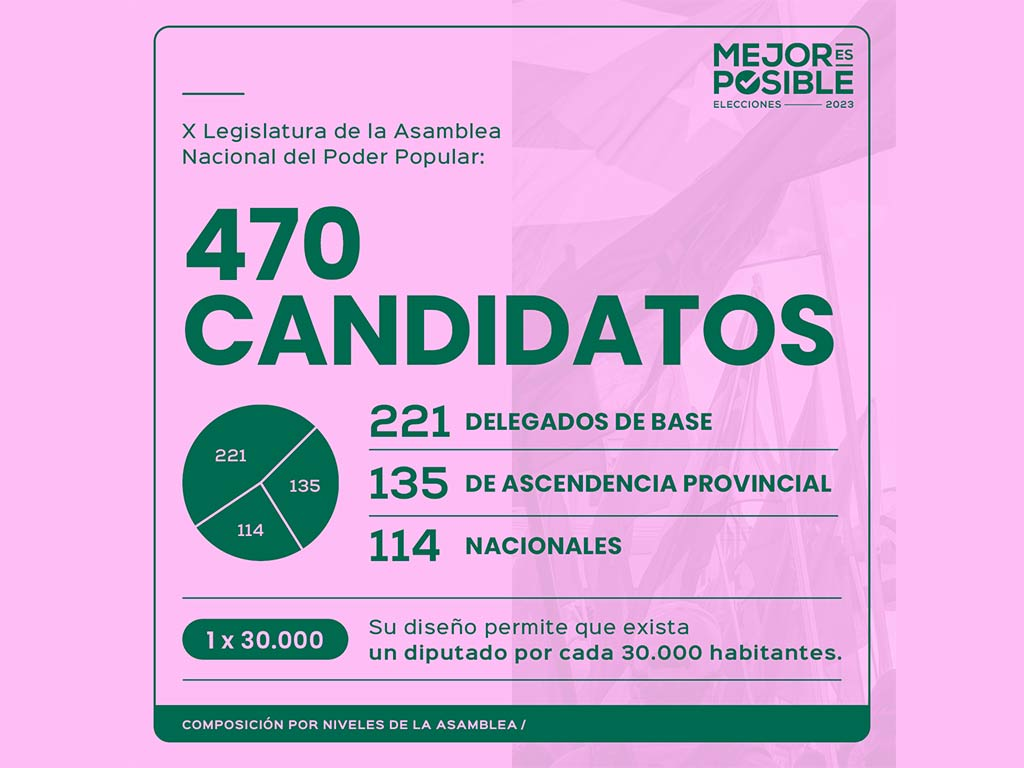
The 470 candidates for deputies to the National Assembly of People's Power are making today and tomorrow the last tours of all municipalities in Cuba as part of a very particular electoral campaign.
By Rafael Calcines Armas
The 470 candidates for deputies to the National Assembly of People's Power are making today and tomorrow the last tours of all municipalities in Cuba as part of a very particular electoral campaign.
This intense activity began on February 6, the day after they were nominated, and ends almost on the eve of the national parliamentary elections, scheduled for March 26.
It is often said that in Cuba there are no electoral campaigns, and it is true if we compare it with those that take place in other parts of the planet.
Because beyond the monotonous exposure in the media of photos and biographical summaries of the nominees, it is far from covering with posters and canvases even the last corners of the cities.
And there are no offers of villas and castles by the candidates to win the vote, something common in other countries, even if they forget what they promised.
In the Cuban model, it is all about meetings with voters through visits to companies, universities, scientific centers, agricultural entities, communities and other social spaces.
Such contacts in the 168 municipalities of the island, from the big cities to the most remote places, are rather a feedback process in which the candidates listen first hand to the opinions, concerns, doubts and expectations of the population.
At the same time, through this dialogue, the population gets to know the character of those who, if elected, will be their representatives at the national level.
Because even though the candidacy includes personalities such as the President of the Republic himself, high-ranking government officials, artists and sportsmen with a regular media presence and renowned scientists, it is made up mostly of citizens who are not known beyond their locality.
Precisely, according to the provisions of the Electoral Law, of the 470 legislators who will form the National Assembly, 356 will be district delegates (basic cell of the government system) and of provincial descent and only 114 (24.2 percent) national delegates.
These meetings also become a platform for analyzing the situation of the country in the midst of an economic crisis in which the effects of the omnipresent US blockade, the world crisis aggravated by the Covid-19 pandemic and undeniable internal deficiencies converge.
Thus, the "Cuban-style" electoral campaign is a way to turn this dialogue into an important moment to take the temperature of the social environment and summon the necessary unity that has guaranteed Cubans to move forward in difficult times.
Of course, both the authorities and the population admit that this form of proselytism is still far from perfect, especially in terms of achieving greater systematization of these meetings -and thus a growing identification- between voters and their representatives.
There are also those, especially from abroad, who qualify these meetings as useless because -they say- the candidates were appointed "by hand", but the number of people who receive the nominees in their communities seems to disprove this criterion.
This may perhaps be influenced by the quality of the previous work of selection of the future legislators, carried out by the candidacy commissions (municipal, provincial and national) made up of representatives of the largest mass and student organizations, and presided over by the Cuban Workers' Central at all levels.
For these elections, these exponents of civil society held 948 plenary meetings from the municipalities to the nation, in which they proposed 19,240 candidates, but since in many of these meetings proposals were repeated, when processing the data, 4,600 names were left.
These were submitted to consultation with each constituency delegate who, in representation of the people who elected them, offered their criteria and approval or not to these pre-candidatures, until the 470 nominees were chosen in assemblies in the 168 municipalities of the nation.
If all of them are elected, 64 percent of the parliament will be renewed, with representatives from almost all sectors of society, 95.5 percent of them with a university degree, more than half of them women, and one out of every five legislators under 35 years of age.
At the close of the campaign tomorrow, only the results of Sunday's elections, direct, free and secret, in which the voter may exercise his right to vote for all the names appearing on his ballot or for one or more of the candidates, remain to be determined.

